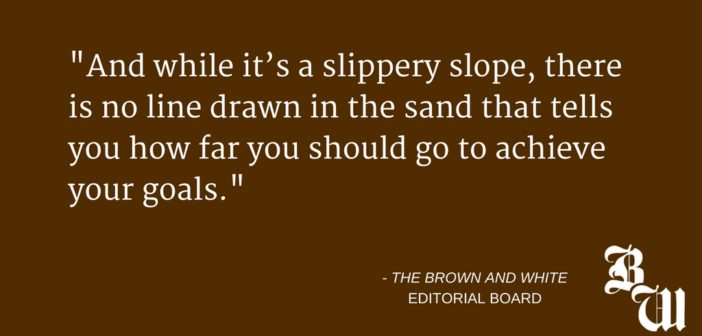In another politically loaded week out of Washington, it was discovered that Attorney General Jeff Sessions lied — or at least bent the truth — under oath during his January confirmation hearing.
The government hasn’t taken action against him yet, but there has been public outcry. People see it as an abominable possibility that sacred, sworn testimony could be compromised.
But why are we so surprised?
This certainly would not be the first time someone has prioritized their own moral standards over the ones imposed at an institutional level.
Take the Lehigh student code of conduct. These rules technically have jurisdiction over all students who attend this school. However, there are some regulations that are broken on a routine basis.
The rules range from classic, unpreventable offenses such as underage drinking to others that concern coursework such as academic integrity.
Every time someone asks a friend to see homework solutions or combs through their organization’s test bank, they are directly contradicting the code of conduct, something all of us pledged to follow when we began our time at Lehigh. In principle, it’s a similar violation to perjury.
But imagine having to swear under oath before taking every exam. It would be a little ridiculous, no? How does student conduct really compare to Sessions’ case of perjury?
Whether he believes in it or not, Sessions has a responsibility to the American people. The public is right to be hypercritical of him because it is our duty to make sure we are holding our government accountable.
In contrast, when a Lehigh student compromises academic integrity by committing a violation like using old tests to study for a class, only that student stands to lose anything if they are caught. Barring any minimal effects on a potential curve, others do not rely on that student’s decision making.
That doesn’t magically legitimize cheating, but it does bring up the legitimacy of a gray area that exists in the pursuit of academic success. The nature of class work can sometimes drastically differ from the development of career-oriented skills. If individuals are willing to circumvent the code of conduct while still adhering to their own moral standards, they might choose to follow their instincts, albeit with the risk of getting caught and suffering the consequences.
As it is, we are confined by our highly-structured education system and paying over $60,000 in the process. We sometimes have to memorize pages of formulas that will almost always be readily available in the real world. Other times we are forced to take distributional requirements that will likely never affect our future.
And while it’s a slippery slope, there is no line drawn in the sand that tells you how far you should go to achieve your goals. When we exit the safe haven of Lehigh, life will be about taking all of the opportunities we can and doing the most with our resources.
In a way, Sessions’ job is easier because no matter his opinion of the importance of his testimony, it’s not up to him to decide whether or not to speak the whole truth and nothing but it. There is too much riding on his honesty.
As students, we are presented with situations every day that force us to choose whether to adhere to Lehigh’s standards or follow our own path.
Stay true to yourself and pursue academic excellence in any way you can. If you do so by bending the rules, that’s your choice but do so at your own risk. You’re going to have to deal with the consequences because what you put into your education is exactly what you get out of it.






Comment policy
Comments posted to The Brown and White website are reviewed by a moderator before being approved. Incendiary speech or harassing language, including comments targeted at individuals, may be deemed unacceptable and not published. Spam and other soliciting will also be declined.
The Brown and White also reserves the right to not publish entirely anonymous comments.
1 Comment
This article is another terrible example of writing by the Brown and White. You write that academic achievement at Lehigh is an example of how some students refute the institution’s morals to achieve their own goals, but then you go on to call Lehigh a “safe haven.” Being a safe haven implies that Lehigh is unlike the real world, but the explicit point your article is trying to make is that Lehigh IS comparable to the real world. You set out to do this when you write, “his certainly would not be the first time someone has prioritized their own moral standards over the ones imposed at an institutional level. Take the Lehigh student code of conduct.” Please improve the quality of your articles this is just ridiculous!